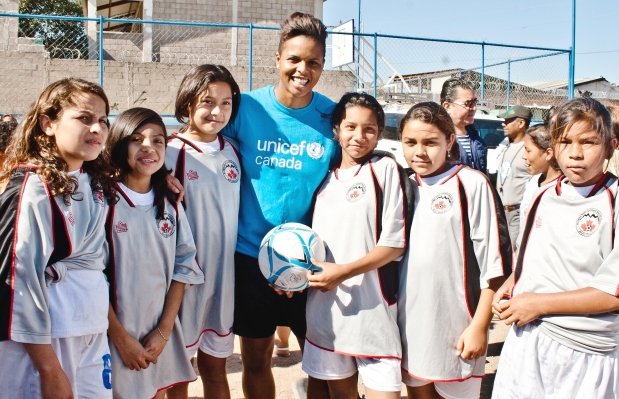 PORTLAND, Ore. — Maple Ridge’s Karina LeBlanc was the last player to leave the field Sunday.
PORTLAND, Ore. — Maple Ridge’s Karina LeBlanc was the last player to leave the field Sunday.
She was signing autographs for young girls. Talking to soccer moms. Beaming into TV cameras.
Inside, media hung around for her long after the final whistle, because she’s a great quote and she’s always smiling.
LeBlanc and the Portland Thorns beat the Seattle Reign 2-1 in their home opener of the new National Women’s Soccer League.
They did it in front of 16,479 boisterous fans at Jeld-Wen Field — bigger than any crowd in the three-year history of Women’s Professional Soccer, which folded last year.
Before kickoff, LeBlanc had lined up with her teammates for a rousing American anthem, a rose shaved into her latest wacky hairdo, in honour of the Rose City.
With dyed red hair and a green goalkeeper’s shirt, she looked a bit like a rose herself.
“I have never loved the American anthem as much as I did today,” LeBlanc admitted afterwards, laughing. “She [the singer] killed it. And when the fireworks when off, I was like ‘Ahh!’
“As a little kid, you have this dream of playing professionally, playing for your national team, and you think of what it would be like to be in a city that loves the sport.
“We’ve played here [with Canada] a couple of times. To come here and know they’re cheering for you, it’s world class. It inspires us to play more and want to be successful.”
When the final whistle goes, when seasons end, LeBlanc doesn’t stop thinking about inspiring others.
The 33-year-old, who’s played in four Women’s World Cups and two Olympics, has long seen her soccer career as a means of doing greater good.
Sport was her way of fitting in as an eight-year-old when her family moved to Canada from the Caribbean island nation of Dominica. Her accent was so thick she was put in ESL. She was bullied.
“It was sport that made me find my way and gave me confidence to believe that there was something bigger for me,” LeBlanc said after practice earlier this week.
The crowd of nearly 17,000 on Sunday — including the Rose City Riveters supporters club, thousands strong, singing behind her goal throughout the first half — gave her goosebumps.
But it was six young girls who recently gave LeBlanc clarity as to how she wanted to channel her considerable energy off the field.
LeBlanc took a trip to Honduras in February with UNICEF Canada. It was part of their Football for Life program, which provides access to education and health care for more than 40,000 kids through the sport.
She arrived in Honduras to find six girls — of the 200 or so who mobbed her — wearing Golden Ears United shirts, her first youth club in Maple Ridge.
“My reaction was, ‘Who did this?’” said LeBlanc, who thought it was staged. “And nobody could understand. It was one of those moments where I’m like: ‘This is exactly where I need to be.’”
In March, UNICEF Canada named LeBlanc its first female soccer ambassador.
She’ll work with them in the off-season, and hopes to visit her native Dominica with UNICEF one day. She’s looking into a clinic in Vancouver, too.
“There’s no player on the (Canadian) team that’s got the same effect on people that I’ve seen,” said Canada’s coach John Herdman, who was in the crowd Sunday, along with U.S. women’s coach Tom Sermanni, U.S. soccer legends Julie Foudy and Mia Hamm, and league commissioner Cheryl Bailey.
“She’s got a unique gift.”
LeBlanc didn’t have much work to do on Sunday.
Portland scored just before the half off a set piece. Burnaby’s Christine Sinclair, who played her college soccer at the University of Portland and came out to massive cheers, set up U.S. star Alex Morgan for the 2-0 goal.
LeBlanc fished one ball out of her net, but had no chance on the shot.
Seattle’s lineup featured Crofton’s Emily Zurrer and Saskatoon’s Kaylyn Kyle, a longtime Whitecap.
“This is why you play the game,” Sinclair said of the atmosphere.
LeBlanc felt the same. And it’s one more story for down the road, when she’s trying to pass on that sense of pride and accomplishment and empowerment.
“You put the ball down and the girls get up and they’re wanting to play,” she said of working in developing countries. “It makes them want to be something more than life has showed them.






